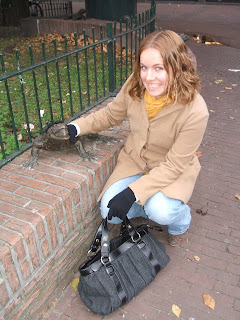I don't know how familiar you are with Danish films, but they tend to be dark, bleak, and depressing. I think it's strange that the happiest country on earth produces the most depressing movies, but maybe they're trying to reach some kind of balance or something -- experiencing traumatic situations vicariously since their lives are just so damn easy. Actually, I've heard speculation that the reason Danes are so happy is that their expectations are so low, and the depressing films support this idea -- if you are constantly expecting a loved one to be paralyzed in a car accident, or to find out your husband is cheating on you, or is dying of cancer, or that he molested your children all throughout their childhoods (plots elements of a few of the Danish dogme movies), then you have to be pleasantly surprised when things turn out alright.
Whatever the reasoning behind the depressing nature of Danish cinema, the same phenomenon apparently applies to literature, at least in the genre written for foreigners trying to learn the language. For Danish class, we each have to read three little books and then discuss them in an oral test next weekend which determines if we can move on to the next module. Anyway, these books are amusing because while they are written to be understandable to someone who has only been learning the language for about two months, they are not children's books -- like Danish movies, they deal with themes such as infidelity, dying/kidnapped babies, post-traumatic stress syndrome, intellectual disabilities, racism, drowning children, etc. But this is all done using very easy words and simple sentence structure -- translated opening line paragraph of one of the books I read, for example: "It is night. Mona can see the moon. It is yellow, and it shines." And it goes on, using similar language, to describe her one year old having febrile seizures, her thinking he's dead and fainting in the arms of the paramedic, etc. Pretty weird. (Btw, he ends up being alright in the end -- in case you were worried).
Anyway -- I just think it's interesting that such an apparently happy country is so obsessed with making themselves sad, but maybe it makes sense. Maybe if you live somewhere where life is difficult and awful, you only want to watch lighthearted movies, to take your mind off your troubles. If, on the other hand, you live in Denmark, where you have nothing to worry about, you need to create some drama in your life to keep yourself from getting too content and bored. Hmm.
Subscribe to:
Post Comments (Atom)

3 comments:
I think Dogma films are a self-equalizing mechanism of Denmark. They keep them from getting too out-of-control happy... keep them in the middle ground. I think the weather and darkness is a SEM as well.
Thanks for the interesting analysis. As you may know, there was a big division of Danish immigrants to the US: the Happy Danes vs the Sad Danes ... really. Each group had its own seminary, lest the gloom of one group infect the sunny disposition of the other.
Given Denmark's present reputation for happiness it appears that most of the Sad variety left back in the 1870s. Perhaps your great great great granny Caroline was among them.
Some additional thoughts on Danish films:
http://www.dailyblague.com/blog/?p=1618
Post a Comment